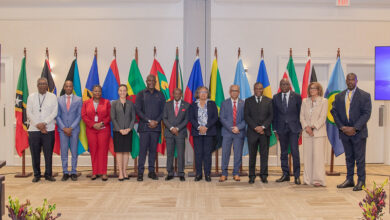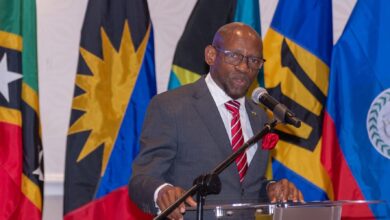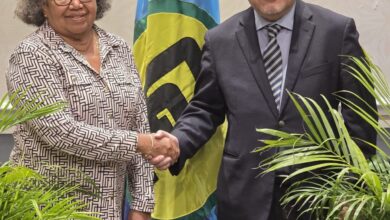The Third Meeting of the Council for Foreign and Community Relations (COFCOR) was held in Port of Spain, Trinidad and Tobago, on 8 -9 May, 2000. The Ministers attending were: the Hon. Janet G. Bostwick, Attorney General and Minister of Foreign Affairs, The Bahamas; the Hon. Billie Miller, Deputy Prime Minister and Minister of Foreign Affairs and Foreign Trade, Barbados; the Hon. Osbourne Riviere, Minister for Trade, Industry and Marketing, Dominica; the Hon. Clement J. Rohee, Minister of Foreign Affairs, Guyana; Dr. the Hon. Paul D. Robertson, Minister of Foreign Affairs, Jamaica; the Hon. Ralph Maraj, Minister of Foreign Affairs, Trinidad and Tobago.
Also representing their respective countries were: Mr. Colin Murdoch, Permanent Secretary in the Ministry of Foreign Affairs, Antigua and Barbuda; Mr. Lawrence A. Sylvester, Director of International Affairs, Ministry of Foreign Affairs, Belize; Mr. Richardson Andrews, Special Adviser to the Prime Minister, Grenada; His Excellency Mr. St. John Payne, Ambassador of St. Kitts and Nevis to CARICOM, OECS and ACS; Mr. Earl Huntley, Permanent Secretary in the Ministry of Foreign Affairs, Saint Lucia; and His Excellency Mr. Humphrey Hasrat, Ambassador of Suriname to CARICOM;
Haiti was represented by Ms. Marie-Michèle Rey, Adviser to the Private Cabinet of the President of the Republic of Haiti and Coordinator of the Office for Coordination of CARICOM Affairs.
OPENING CEREMONY
The Meeting observed a minute's silence in honour of the passing of His Excellency Lee Moore, Permanent Representative of St. Kitts and Nevis to the United Nations and former Head of Government and Attorney-General of St. Kitts and Nevis; and His Excellency Mike Mena, Ambassador of Belize to Guatemala.
In his opening remarks, the Secretary-General of the Caribbean Community, Mr. Edwin Carrington described H.E. Lee Moore as a “true stalwart in the Community…, an erudite scholar and a man of integrity”.
Mr. Carrington said Ambassador Mena contributed significantly to the development of relations between Belize and Guatemala, adding that the Community will remember him for his diplomacy and the determination he exhibited in alleviating tensions between the two countries.
Turning to CARICOM, the Secretary-General highlighted the “growing maturity” of the Community in the coordination of the Region's foreign policy.
In his remarks, His Excellency Mr. St. John Payne, Ambassador of St. Kitts and Nevis to CARICOM, OECS and ACS, said CARICOM has established links with almost every geographic region, which will redound to the benefit of the Region and its people. He encouraged further dialogue with international organisations and countries to address issues of disaster management, debt, human resource management and other constraints of small island developing states.
In delivering the feature address, the Hon. Ralph Maraj, Minister of Foreign Affairs of Trinidad and Tobago, urged Member States to pursue global initiatives that take into account the special needs and interests of the Region. Mr. Maraj noted that globalisation has increased the vulnerabilities of countries of the South and has resulted in the marginalisation of two thirds of the world's population.
“We must continue to call for an international economic system that is equitable, transparent, inclusive, participating and broad-based,” Mr. Maraj said.
Global Policy Issues
The Ministers acknowledged the benefits of globalisation, but noted that it has left many countries of the South more vulnerable and further marginalised. They recognised that trade, capital flows and technological developments have impacted significantly on domestic economies as well as on international relations. The Ministers cited poverty reduction and eradication, improvements in the health, education and other social conditions in developing countries, as well as the promotion of growth with equity as issues which should be high on the international agenda.
In spite of their democratic traditions, having good human rights records, high educational levels, and relatively high levels of per capita income, the Ministers observed that CARICOM States were still unable to obtain adequate levels of international funding. They welcomed the work of the Commonwealth Secretariat/World Bank Joint Task Force on Small States and the recent acceptance of its report by the Development Committee of the World Bank and the International Monetary Fund and now look forward to the implementation of the recommendations by the international community , in particular, the various international organisations.
Hemispheric Agenda:
CARICOM-USA Relations
The Meeting considered the possible implications of the forthcoming Presidential elections in the USA for the Region's relations with that country. The Meeting also considered the future of CARICOM/US relations in the context of the Bridgetown Accord and the second annual meeting between Ministers of Foreign Affairs/Secretary of State of the Caribbean and the US Secretary of State in April in New Orleans, USA.
The Ministers proposed reinforcing the Bridgetown Accord and, to this end, recommended that a CARICOM Ministerial Mission be mounted to the USA, as such an initiative could influence future US Administration's approach to the Region. They decided that the Mission would be coordinated by the Minister of Foreign Affairs of Trinidad and Tobago and that CARICOM Representatives in Washington could best advise on a suitable time and programme for the Mission.
The Ministers considered the issues arising from the second annual meeting between the Ministers of Foreign Affairs and the US Secretary of State on 29 March, 2000 in New Orleans. Within this framework, the COFCOR welcomed the advances made with regard to the passing of the CBI Enhancement Bill and identified inter alia, the following as continuing to be critical to the Caribbean:
- Further strengthening of a joint approach to fight drug trafficking, firearms, etc.
- Completion of discussions on a memorandum of understanding on deportation procedures that are acceptable to both parties.
- Speedy implementation of the agreed support and cooperation in the USAID/Caribbean Regional Strategy and Five-Year Programme of Assistance with regard to trade, business development, economic diversification and investment.
They agreed that the Minister of Foreign Affairs of Trinidad and Tobago should continue to engage the US Secretary of State on the relationship. Ministers of the Region, will meet the US Secretary of State in the margins of the United Nations General Assembly in September.
Issues before the OAS
In relation to the Thirtieth Regular Session of the OAS General Assembly, the Ministers noted that during the Private Dialogue, Heads of Delegation would concentrate on the Agenda, Focus and Format of the Third Summit of the Americas, and that the Plenary Dialogue would consider the theme: Human Security in the Americas and the modernisation of the OAS.
In acknowledging the importance of the Inter-American Agency for Cooperation and Development, the COFCOR agreed that the Region needed to ensure that its interests were reflected in the Strategic Plan being developed by the Director of the IACD for the period 2002-2005.
The Meeting therefore reiterated the need for CARICOM to maintain representation on the Board of the Agency.
The Ministers recognised the growing role of the OAS in the Summit Implementation Review Group (SIRG) process and stressed the Region's need to participate more fully and in a more coordinated manner in that process, preparation for which should start as soon as possible.
Association of Caribbean States (ACS)
The Ministers reviewed the Region's participation in the ACS. They welcomed the presentation made by the new ACS Secretary-General Dr. Norman Girvan on the general thrust of the Organisation. They reconfirmed their commitment to that Organisation and committed the Region to a stronger involvement in the Association.
The Rio Group
The Ministers commended Guyana for the role it had played over the past three years in representing the Region on the Rio Group, a Group which continues to provide a strategic platform for the Region's hemispheric initiatives. They looked forward to Guyana continuing this representation in the next period.
Europe
European Union/Latin American and the Caribbean (EU/LAC) Summit Follow-up Process:
The Ministers reviewed the EU/LAC Summit follow-up process and commended Guyana for its role in this regard.
The Ministers considered it important for the Region to identify priorities and make recommendations on the advancement of those priorities.
Relations with France
The Ministers reviewed the issues arising from the First Franco-Caribbean Summit. They noted with concern the subsequent contradictory stance adopted by France on the Commonwealth Secretariat/World Bank Report on Small States, and France's proposed withdrawal from the Caribbean Development Bank (CDB). They noted that steps have already been taken to draw the Region's concerns to the attention of the French President.
The Ministers stressed the need to enhance and strengthen collaboration between the French Departments and CARICOM States as proposed by the French President at the Summit. They mandated the Secretariat to formulate activities to foster this new relationship as well as proposals for a follow-up and implementation machinery.
Relations with the United Kingdom
The Ministers, in their preparations for the Second UK-Caribbean Forum, to be held in London on 11 – 12 May, addressed issues pertaining to the arrangements for that meeting. The Forum is aimed at enhancing relations between the Caribbean and the UK. They agree to concentrate in their deliberations on issues related to the vulnerability of small states, education, the EU-ACP Partnership Agreement, the expeditious implementation of the HIPC programme, the promotion of greater trade and investment, the EU/Caribbean partnership in fighting crime and the role of the UK in the EU and the Group of Seven, in the promotion of CARICOM interests.
Spain
The Ministers noted that since the first CARICOM/Spain Summit, progress had been made in the establishment by Spain of a Chair at the University of the West Indies (UWI) for the teaching of Spanish. They also recognised the critical role which Spain could play in the area of tourism development in the Region.
The Ministers mandated the Secretariat to identify, through research, other areas of potential interest to the Region.
Asia
Japan:
The Ministers reviewed the CARICOM/Japan relationship and reaffirmed the importance which they attached to this relationship.
The Ministers agreed to respond positively to an invitation by the Government of Japan to hold a Japan-CARICOM/Japan Foreign Ministers Meeting in that country. They acknowledged strategic importance of Japan globally as a member of the Group of Seven and the relationship which had been developing between CARICOM and Japan over recent years.
Africa
Southern Africa:
The Ministers reaffirmed the need for a constructive engagement between CARICOM and Southern Africa. They agreed that the focus should be on functional cooperation and the promotion of trade, tourism, transportation and investment. They agreed that further thought should be given to having a CARICOM presence in Southern Africa.
With respect to the situation in Zimbabwe, the Minister issued the following statement:
“The Ministers welcomed the decision of the Commonwealth Secretary-General to visit Zimbabwe this month to discuss the situation with the Government of Zimbabwe and to convey the deep concerns of the Group.
They shared the concerns of the Commonwealth Ministers Action Group (CMAG) on the ongoing violence, loss of life, illegal occupation of property, failure to uphold the Rule of Law and political intimidation in the run-up to Zimbabwe's parliamentary elections.
They urged the Government of Zimbabwe to ensure that the Rule of Law prevailed both with regard to the onslaught on property and lives of white Zimbabweans or on the settlement reached at independence on land reform for the vast majority of Zimbabweans.
The Ministers noted that the United Kingdom and Zimbabwe are already engaged in dialogue on the issue. They therefore expressed the wish that the dialogue will come to a early and peaceful resolution.
They urged, with regard to distribution, that land reform should be fair and equitable.
They noted Commonwealth initiatives to field an Observer Mission to Zimbabwe to monitor the elections in that country shortly to be held.”
Institutions
The Commonwealth:
The Ministers recalled the discussions at the 1999 Commonwealth Heads of Government Meeting in Durban, South Africa, relating to the Region's participation through Trinidad and Tobago in the High level Commonwealth Review Group established to review the role of the Commonwealth.
They urged Trinidad and Tobago to ensure that the group consider as a priority the role of the CMAG as mandated in Durban. Barbados is the Region's representative.
United Nations:
Finance for Development
The Ministers took note of the decision of the United Nations to convene a special Conference in 2001 on the theme “Financing for Development”. They recommended that CARICOM Missions in New York continue to be actively involved in preparations for the Conference and that the topic of “debt ” be clearly identified as an issue for inclusion in the discussions.
The Ministers also recommended that the CARICOM Secretariat send experts to participate in the preparatory sessions and assist in the formulation of CARICOM's positions on the agenda items.
Millennium Summit
The Ministers noted that the Secretary-General of the United Nations had developed a Paper “We the People of the United Nations” which outlined the issues of focus for the Millennium Summit scheduled to take place in September 2000.
They agreed that the Region would seek to coordinate views on these issues in preparation for its participation in the process.
International Civilian Mission in Haiti (MICAH):
The Ministers noted that the United Nations Secretary-General will lead a mission to Haiti shortly to examine ways of financing UN experts working in the areas of law enforcement and the administration of justice in Haiti. They also noted that no assurances had yet been given that funds would be allocated to allow the MICAH to remain in Haiti. They reiterated their support for the work of the MICAH. They noted that the United States had pledged to contribute to its work. The Ministers welcomed this and urged other donors to do likewise.
Candidatures:
The Ministers endorsed a number of CARICOM candidates proposed for election in the UN and inter-American systems. They also exchanged information on support sought by extra-regional candidates institutions of primary importance within those systems in an effort to coordinate the Region's positioning in the various international fora. The Ministers discussed extensively the candidature for the position of the Assistant Secretary-General to the OAS.
The Ministers agreed that the Chairman of the COFCOR and the CARICOM Secretary-General should engage as soon as possible in discussions with the candidates on their views with respect to the Region's interests and expectations.
South Summit
The South Summit which was held in Havana, Cuba from 10-14 February 2000 marked a turning point in the history of cooperation among developing countries. For the first time, Heads of State and Government of the Group of 77 and China collectively reflected on the rapidly changing world economic situation, and on renewed complex challenges facing the developing countries. The Summit also identified opportunities for closer collaboration among the countries of the Summit and formulated a collective approach for interacting with the developed world.
The Ministers acknowledged that the Plan of Action adopted by the Summit, signals a more pro-active approach by the developing countries towards the creation of a more just and equitable world system.
Electoral Missions
Haiti:
The Ministers recalled the decisions of the Conference of Heads of Government of the Caribbean Community in October 1999 to provide support to the Haitian electoral process. Legislative, municipal and local elections are scheduled for 21 May, 2000 in Haiti.
The Ministers noted that the CARICOM Secretariat had made the necessary arrangements to field a CARICOM Electoral Observer Mission to Haiti. The Mission would include a Core Group of five persons (Chief of Mission and four Observers) and 19 additional observers
The Core Group is expected to travel to Haiti nine days before the elections to monitor the preparations for the elections. The additional Observers will join the Mission for the actual day of the elections to assist in the monitoring process.
The Core Group will remain in Haiti for four days following the elections to assess the outcome, and will return in June 2000 for the second round of elections, provided these are scheduled.
CARICOM will collaborate with the OAS Electoral Observer Mission in the provision of electoral support to Haiti, but will maintain a distinctive CARICOM profile.
Suriname:
The Ministers noted the proposed arrangements for the Electoral Observer Mission to Suriname, as well as the contribution required by Member States to fund CARICOM's support to the Suriname electoral process.
As with the Observer Mission to Haiti, CARICOM will collaborate with the OAS Electoral Mission in the provision of electoral support to Suriname.
Belize/Guatemala:
The Ministers recalled the strong statement on the territorial dispute between Belize and Guatemala issued by the Conference of Heads of Government of the Caribbean Community at its Eleventh Inter-Sessional Meeting on 14th March 2000 at Basseterre, St. Kitts and Nevis. They were therefore disturbed by incidents which continue to threaten peace and security in the Region.
The Ministers called on Belize and Guatemala to intensify their confidence-building mechanisms that will ensure a climate favourable to a peaceful resolution. They urged both parties to continue genuine and serious political dialogue to find a definitive settlement to the long-standing dispute in accordance with the principles of International Law.
The Ministers reaffirmed their unequivocal support for the territorial integrity and sovereignty of Belize and expressed the hope for improvement in relations between Belize and Guatemala.
Guyana/Venezuela:
The Ministers reiterated their firm support for the sovereignty and territorial integrity of Guyana.
They recalled that in November 1999 the Commonwealth Heads of Government had established a Ministerial Group on Guyana to monitor further developments in respect of the existing controversy. They also recalled that the Foreign Ministers of the Non Aligned Movement, at their meeting in Cartagena in April 2000, fully supported the parties in their commitment towards a peaceful settlement to the controversy within the framework of the Good Officer process of the United Nations.
The Ministers welcomed the progress being made under the High Level Bilateral Mechanism and viewed this as a positive indication of the interest of both countries in promoting closer relations and enhanced functional cooperation.
Appreciation
The Ministers expressed their appreciation to the Government and People of Trinidad and Tobago for the excellent and warm hospitality offered them during their stay.
They also extended their appreciation to the Committee of Senior Officials who had prepared for their Meeting which allowed them to address the issues discussed in an informed manner.
Date and Venue
The Ministers accepted the offer of the Government of the Republic of Guyana to host the Fourth Meeting of the COFCOR in that country on 7-8 May 2001.
Port-of-Spain
Trinidad and Tobago
9 May 2000





